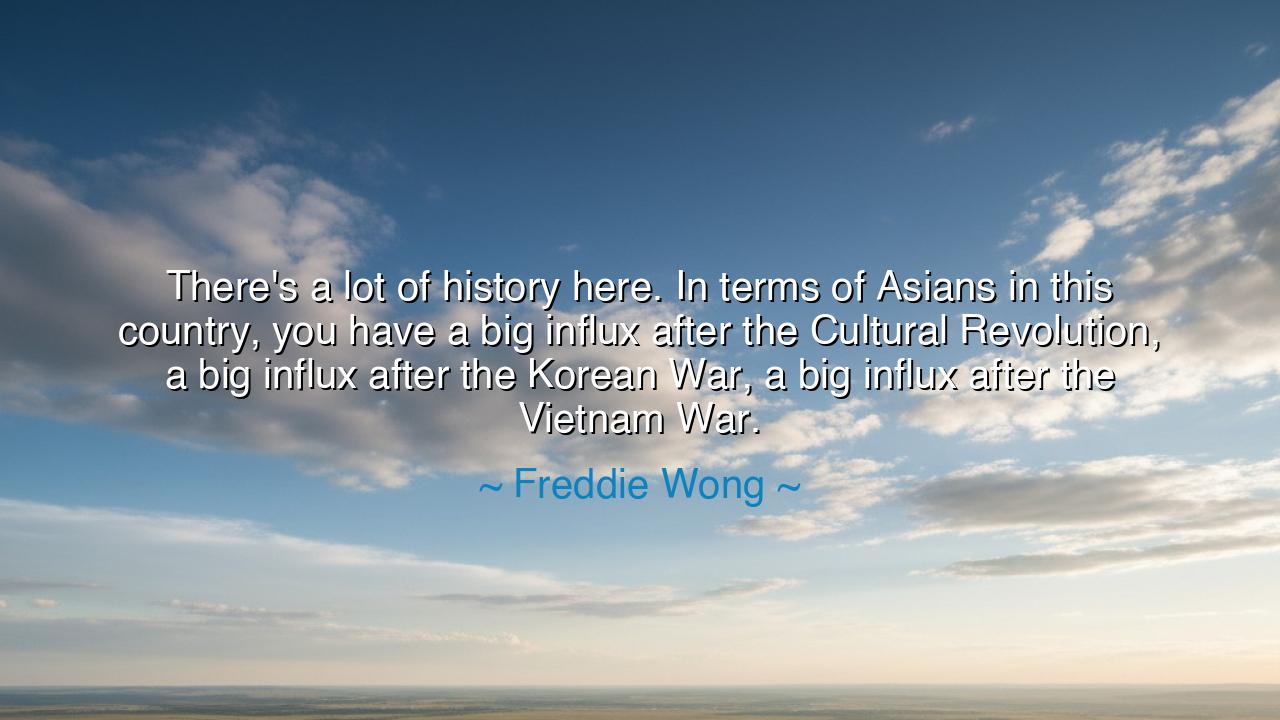
There's a lot of history here. In terms of Asians in this
There's a lot of history here. In terms of Asians in this country, you have a big influx after the Cultural Revolution, a big influx after the Korean War, a big influx after the Vietnam War.






“There's a lot of history here. In terms of Asians in this country, you have a big influx after the Cultural Revolution, a big influx after the Korean War, a big influx after the Vietnam War.” — Freddie Wong
Thus spoke Freddie Wong, a creator and storyteller who carries within him not only his own voice but the echoes of countless journeys — the migrations, the struggles, and the triumphs of Asian Americans who crossed oceans to find a home in a new world. His words are not mere observation; they are a remembrance, a gentle call to see the invisible rivers of history that have flowed into the heart of America. When he says, “There’s a lot of history here,” he reminds us that behind every face lies a story older than arrival, deeper than belonging — a tale of displacement, courage, and transformation that continues to shape the land today.
The Cultural Revolution, the Korean War, the Vietnam War — these were not just events written in the pages of history, but great upheavals that scattered families like leaves upon the wind. After each storm, waves of souls sought refuge and renewal in foreign lands. From the ashes of revolution and war, they came — not as conquerors, but as survivors, carrying with them the light of their ancestors and the burden of memory. Wong’s words are an invocation to remember them — to see that the Asian presence in America is not a single thread, but a tapestry woven from many migrations, each born of struggle and hope.
Let us recall, for instance, the story of the Vietnamese boat people — men, women, and children who fled their war-torn homeland by sea after 1975. They crossed dark waters in fragile vessels, facing storms, starvation, and pirates, yet their will to live did not falter. Those who survived built new lives in distant lands, bringing with them their language, their cuisine, their values of family and perseverance. From the refugee camps of Malaysia to the bustling markets of California, their story became part of the greater story of America itself — proof that even from despair, resilience can rise like dawn.
And before them, there were others — the Korean immigrants who came in the wake of the Korean War, their homeland divided, their hearts torn between north and south. They arrived with little but the determination to rebuild. Many opened small shops, dry cleaners, and markets, working endless hours to carve out a place in an unfamiliar world. In their hands, work became worship — an offering to the future they could not yet see. Their children, born of that sacrifice, now stand as doctors, artists, leaders, and innovators, their lives a living testament to the enduring flame of their parents’ hope in exile.
And before them still, there were those who fled the Cultural Revolution in China — scholars and thinkers, farmers and workers — escaping a time when tradition and intellect were torn apart by ideology. They came seeking freedom of thought, bringing with them centuries of heritage that might otherwise have been silenced. In their migration, they carried the seeds of ancient philosophy and modern wisdom, helping to shape America’s universities, businesses, and cultural life. Each generation’s influx was not merely an addition to the population — it was an infusion of spirit, of labor, and of faith in humanity’s power to begin again.
Freddie Wong, in speaking these words, reminds us that the Asian American story is not a footnote, but a chapter written in perseverance and transformation. These communities did not merely adapt — they transformed the soil they touched. From cuisine to cinema, from science to song, they have enriched the nation’s soul. Yet, too often, their sacrifices have been unseen, their stories unheard. His words serve as both remembrance and warning: that when we forget the origins of a people, we lose a piece of ourselves — for the history of any group, once woven into the fabric of a nation, belongs to all.
Therefore, O children of this diverse and restless world, take this wisdom to heart: honor the journeys that built the ground beneath your feet. Every face you pass on the street may carry a lineage of flight and endurance. Seek to learn these stories, to tell them, to preserve them. For when we remember the influxes of the past, we remember that humanity itself is one great migration — ever seeking freedom, safety, and belonging.
Let your heart, then, be a harbor — welcoming, understanding, and just. Let your work, your art, and your life design bridges, not walls. For as Freddie Wong’s words remind us, history is not behind us; it is within us. We are all travelers upon the same tide of time, and when we honor the journeys of others, we keep alive the sacred truth that every people, in every age, carries a spark of the eternal human spirit — the courage to begin anew.






AAdministratorAdministrator
Welcome, honored guests. Please leave a comment, we will respond soon